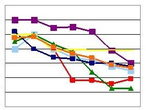New Paper in Governance
In a paper that just came out in Governance, Reimut Zohlnhöfer, Jan Jathe and Fabian Engler ask if the financial and economic crisis of 2008/9 induced a permanent shift to more economic intervention in the advanced democracies. They present data from a new index of economic intervention, which show that governments increased economic intervention during the immediate crisis but returned to liberalization afterward. Similarly, statistical analyses show that partisan differences disappear during the acute crisis but return thereafter. Read the paper here
New Paper in West European Politics
In a new paper that just came out in West European Politics, Fabian Engler, Jan Jathe and Reimut Zohlnhöfer provide a comprehensive picture of government intervention in the economy by aggregating five economic policy instruments (regulation, state ownership, business taxation, subsidisation, government
spending) into one index for 20 OECD countries between 1981 and 2018. They find that parties still matter but that partisan differences are particularly relevant when unemployment is high, but disappear as unemployment increases. Moreover, partisan differences decrease with the level of globalisation. Read the full paper here
New Book with Cambridge UP on State of the art of MSF
Together with Rob A. DeLeo and Nikolaos Zahariadis, Reimut Zohlnhöfer has written a book on the state of the art of the Multiple Streams Framework. It has just come up with Cambridge University Press and you can download it here
Project on History of the Federal Ministry of Finance started
A new project, funded by the Federal Ministry of Finance, has started. That project looks into the politics and policies of budget consolidation in Germany in the 1970s and 1980s, specifically from the point of view of the ministry. The project is part of a large project on the History of the Federal Ministry of Finance, in which seven other colleagues at different universities are involved. Thaisa Cäsar has started working in the Heidelberg project part in February – welcome Thaisa!
PACOGOV data updated
We have updated the Partisan Composition of Governments Database (PACOGOV) for the years 2021 and 2022. It now covers 24 advanced democracies for the 1945-2022 time period. You’ll find it here.
New edited volume on MSF
“A Modern Guide to the Multiple Streams Framework” just came out with Edward Elgar. Edited by Reimut Zohlnhöfer together with Nikolaos Zahariadis, Nicole Herweg and Evangelia Petridou, the volume contains 17 chapters that seek to advance the MSF in various ways, either by refining the framework theoretically or by applying it empirically to new contexts. For example, Reimut Zohlnhöfer’s chapter discusses if the MSF can be used to explain the scope of policy changes – and argues that it can. Find out more about the book here
Theories of the Policy Process, 5th edition
The fifth edition of the state-of-the-art volume “Theories of the Policy Process”, edited by Christopher M. Weible, has just come out with Routledge. It includes a chapter by Nicole Herweg, Nikolaos Zahariadis and Reimut Zohlnhöfer that brings you up-to-date with all the latest developments regarding the Multiple Streams Framework.
Division of Labour and Dissenting Voting Behaviour of MPs in a ‘Working Parliament’
A new article by Philipp Mai, published in European Political Science Review, shows that Members of Parliament (MPs) vote less frequently against the party line if topics are concerned which they deal with during their committee work. This effect is further conditioned by spokesperson offices, vote type and issue salience. Read more here. [Link]
How to measure partisan differences in quantitative analyses?
In a new paper that just came out with Zeitschrift für Vergleichende Politikwissenschaft/German Journal of Comparative Politics, Reimut Zohlnhöfer challenges the idea that using governing parties’ policy positions is necessarily desirable in quantitative analyses of partisan differences in public policies. Rather, for some research questions parties’ affiliation with certain party families is the preferable solution. Do you want to know why? Find open access the paper here.
Handbuch Policy-Forschung 2nd edition out now
The German language Handbuch Policy-Forschung (Handbook on Public Policy Research), co-edited by Reimut Zohlnhöfer with Georg Wenzelburger, is out now in print and online with Springer. In 33 chapters, leading experts provide up-to-date insights into the latest research of the field on theories, methods and issue areas. The second edition is not only substantially updated but also contains six new chapters!
New Monograph out on Fridays for Future and Corona Non-Compliance
Together with Peter Kirsch (psychology) and Hanno Kube (public law) Reimut Zohlnhöfer has written a book on who breaks rules to gain attention for their political concerns. Using the cases of Fridays for Future and Corona Non-Compliance in Germany as examples, they show that these groups differ tremendously with regard to many factors. You can find the German language book here – and the English version here
New article on the role of party socialization for legislative behavior
New Edited Volume: Merkel’s last act
How to apply the MSF
How to apply the MSF to autocracies
New Article in the BJIR
New paper in EPSR: How unemployment conditions the partisan politics of employment protection
PACOGOV data updated
New paper on the partisan politics of employment protection
New Paper: Do School Strikes Matter for Political Agenda Setting?
Data on Partisan Composition of Governments now available
Best JCPA Article Award!
What do Germans think about Corona restrictions?
Why do parties make a difference? New paper in Party Politics
Paper on Citizens’ Policy Know
Marsilius Fellowship for Reimut Zohlnhöfer
Pierson’s „Dismantling the Welfare State?“ After 25 Years
Special Issue on the third Merkel government published.
Edited volume on the third Merkel Government
New Paper in Political Behavior
New Article in Socio-Economic Review
Section on Policy Process Theories at ECPR General Conference in Hamburg 2018
Theories of the Policy Process (4th edition)
New Book on European Union Policy-Making
Literature Review on the Interventionist State in the British Journal of Political Science
New Article on Political Parties and MPs‘ Morality Policy Voting Behaviour
New edited volume on the Multiple Streams Framework
EJPR Forum Section on Multiple Streams Framework
Handbuch Policy-Forschung erschienen
Politik im Zeichen der Krise – Bilanzen der zweiten Regierung Merkel
Developments in German Politics 4 erschienen
„Große Koalitionen besser als ihr Ruf“
Symposium zur Validität von Lohnersatzraten in JEPP
Fritz Thyssen Preis für sozialwissenschaftliche Aufsätze
Neuer Aufsatz zu Privatisierungspolitik in Comparative Political Studies
Neues Forschungsprojekt: Political Expectations and Responsibility Attribution
Was haben die Föderalismusreformen gebracht?





